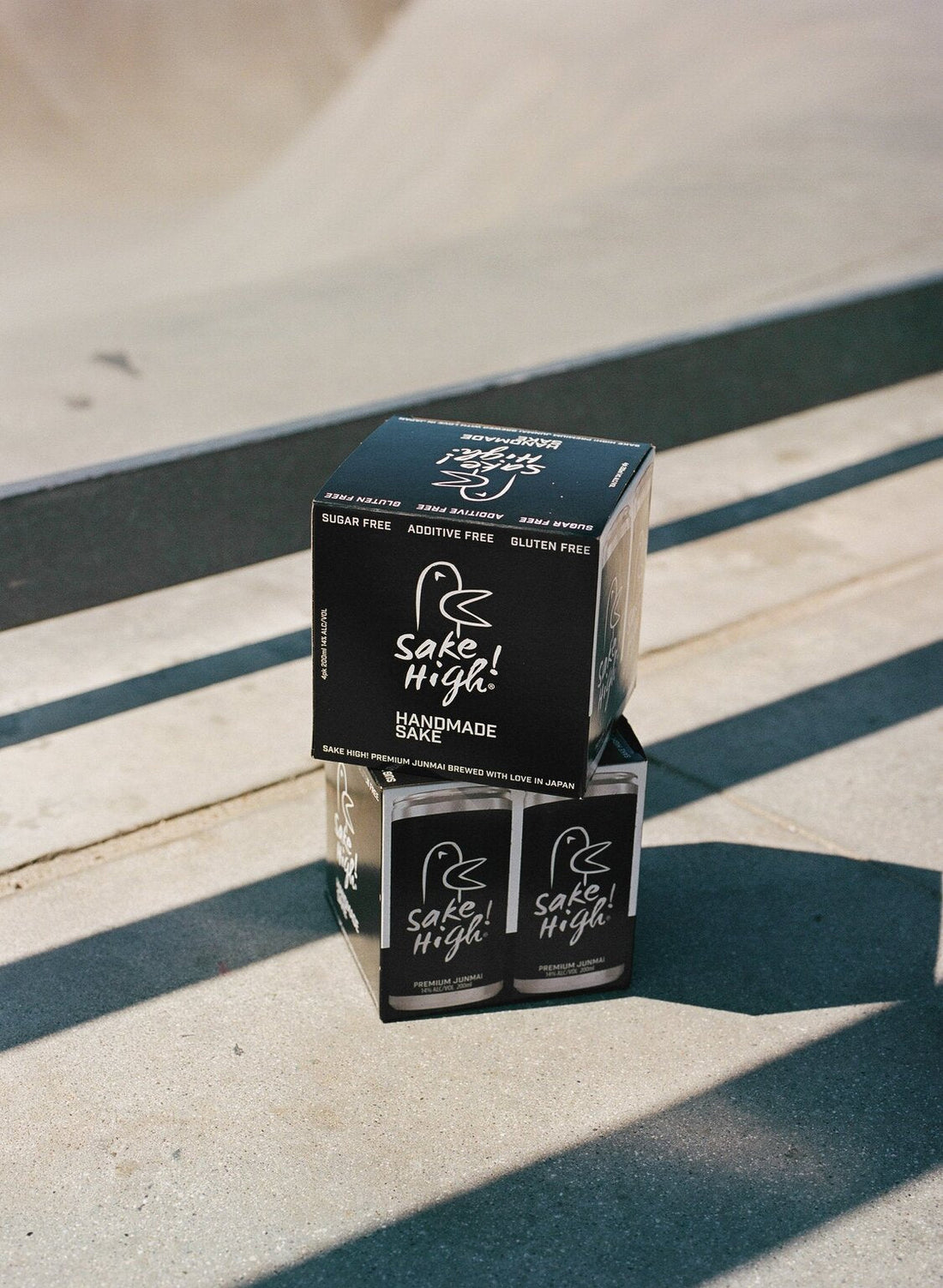
Sake 101 - Is Sake Good for you?
There are so many food and beverage products on the market right now advertising that they are healthy, better for you, and all natural. But, is sake good for you?
Consumers often get misled and confused by the labels and usually just end up picking the seltzer or the pretzels that have the best branding since they all use these healthy buzz words. It’s even trickier in the alcohol space. There are so many health motivated ready to drink options like hard seltzers, hard lemonade, all natural wine, light beer, and hard kombucha. The cans and the labels are filled with phrases like low calorie (or the most popular, “under 100 calories per serving”), gluten-free, organic, all-natural, biodynamic, and no preservatives.
So, where does sake fit into one's health routine, and what are the benefits of sake? Keep reading for more information.
What is Sake High!?
Let’s start at the beginning_ What is Sake High!? Sake High! is Junmai sake. Junmai sake is one of the purest sakes because there’s nothing extra added to it in the brewing process. Junmai, which means “pure rice”, indicates that high-strength distilled alcohol was not added before filtration in the brewing process. Instead, it’s made with rice, water, yeast and Koji (read: no additives or extra alcohol) – which means no added starch or sugars. . So, when you compare Junmai sake to other sakes and rice wines, you are drinking one of the purest sakes.
Is Sake Good For You?
The list of health benefits of sake is endless. Here are some key reasons why sake is good for you.
-
Purity: There are no additives or preservatives like sulfites, which means less headaches and better sleep! 80% of sake is water, and Sake High! uses one of the purest water sources in the city of Kyoto, Japan.
-
Boosted immune system_ Sake is rich in amino acid compounds like selenium. Plus, some of the enzyme inhibitors in the koji (the rice mold present in the brewing process) help build and strengthen bone health.
-
Good for the gut : Sake is a probiotic and low in acidity, both options that promote better digestion.
-
Fewer allergens_ Many drinkers don’t realize the after-effects of their drinking might be coming from sulfite allergies or sensitivity to tannins. Sake has neither of these, which makes sake a better choice for most drinker!
Sake Benefits
So what’s all this talk about purity and sulfites? Well, if you’ve had a few glasses of red wine, you know the sluggish feeling that comes with it when you are getting ready for bed – as well the headache that comes in the morning. Sake contains vital nutrients, and there’s no added junk in it to alter its taste, color, or shelf life. Even when a canned or bottled wine is labeled organic or biodynamic, a lot of them still add sugars and preservatives. Organic is a misled label in the US, so it’s important to do the research to see what is actually being added into your drink. Sake High! is small batched, and uses high quality ingredients sourced locally to Kyoto to avoid any manipulation and to stay true to the handmade and heartfelt brewing techniques of sake.
Is Sake Healthy to Drink?
A healthy benefit of sake is the portioned pours. With all the new trends right now of no drinking on weekdays, or sober months to catch up on your routine, you see many people making up for the lack of drinking on the other side with binge drinking. It’s pretty tough to binge-drink sake because of the portion sizes and social activity focusing more on consuming with intention, sipping on a smaller pour instead of chugging. The tradition of sake is to pour for others often to promote community and generosity. If you’re a beer drinker, consider switching to Sake High! Since there’s less hops, which means less bloat and more buzz without the sluggish feeling.
Sake High! should always be served chilled (read warm vs cold sake) and if you’ve had chilled sake you know it goes down very easily! Make sure to sip it slowly so that you can reap the health benefits of sake, rather than knocking back a few and feeling the after-effects of overdoing it the next day!
Not to mention, because the alcohol percentage of sake is high (15% ABV), you are consuming less liquid than you would be of beer or wine which we all know is calorie heavy once you get on to your second or third glass. Any drink becomes fattening the more you drink it, but, with sake, you’ll feel the buzz quicker because of the high ABV, which means less calories to consume.
Is Sake Good For Your Skin?
And what’s all this talk about taking a bath in sake? I’ll tell you! There are a lot of benefits of sake, and one of them is sake is good for your skin. During the sake fermentation process, the rice wine (sake) becomes rich in smoothing enzymes and microbiome-friendly prebiotic sugars. Many bloggers and purists love to bathe in pure sake baths because the rich sake supports your skin’s moisture barrier, leaving your skin soft, smooth looking, and might even make you glow! The prebiotic sugars from the sake help aid your skin in building healthy bacteria so your skin radiates. Many clean beauty and skincare brands (focus on sustainability, pure ingredients, and the relationship between your gut and skin) include sake as one of their ingredients in their serums and body lotions like Cocokind’s Sake Body Lotion. If you’re really into glowing skin and might just want to relax, try adding in some sake (Sake High! is a great option) into your next bath routine and mix it into the warm water, just make sure to test the temperature so you don’t burn! Relax and vibe with our favorite tunes.
At the end of the day, Sake High! is still rice wine, and you can always overdo it. It’s still medically unclear if wine and alcohol can bring medical benefits, but there are clear healthier benefits of drinking sake due to its pure ingredients and fermentation process. And, always mix in some water and snacks so you aren’t drinking on an empty stomach. So, when you go to your favorite store and buy Sake High!, you can do so with confidence!
Want to learn more about sake? Learn the different classifications of sake and five reasons to choose Sake High!.
Sip & Read More >>
